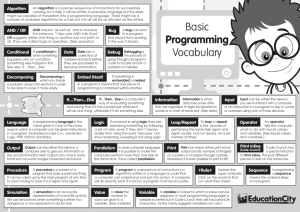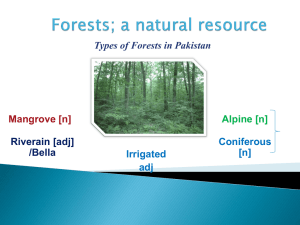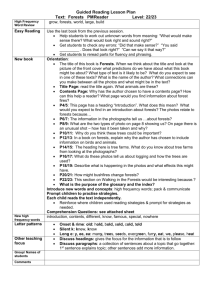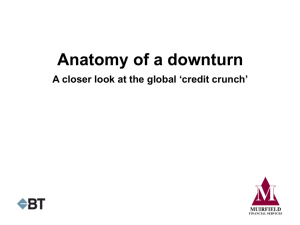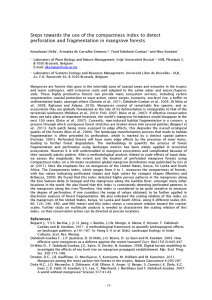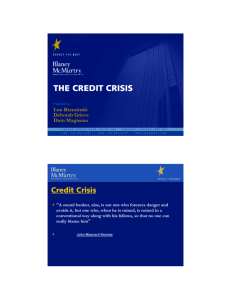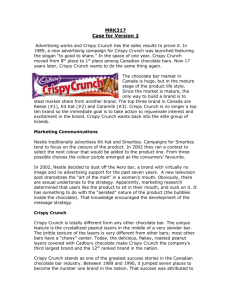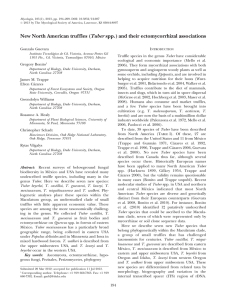Document
advertisement
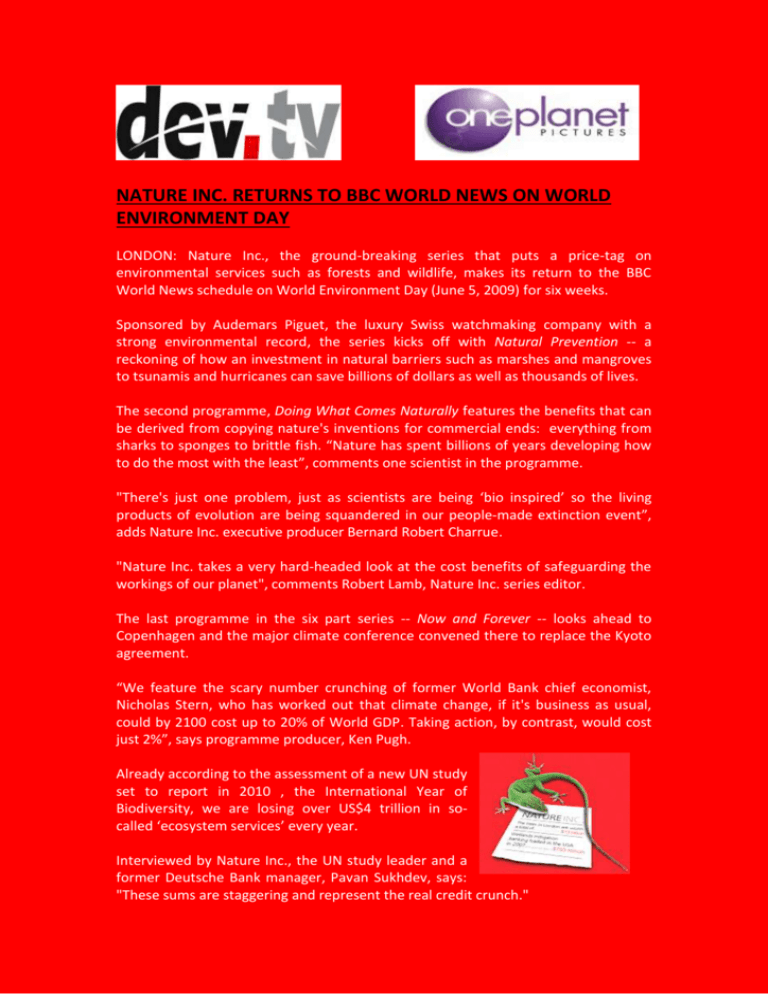
NATURE INC. RETURNS TO BBC WORLD NEWS ON WORLD ENVIRONMENT DAY LONDON: Nature Inc., the ground-breaking series that puts a price-tag on environmental services such as forests and wildlife, makes its return to the BBC World News schedule on World Environment Day (June 5, 2009) for six weeks. Sponsored by Audemars Piguet, the luxury Swiss watchmaking company with a strong environmental record, the series kicks off with Natural Prevention -- a reckoning of how an investment in natural barriers such as marshes and mangroves to tsunamis and hurricanes can save billions of dollars as well as thousands of lives. The second programme, Doing What Comes Naturally features the benefits that can be derived from copying nature's inventions for commercial ends: everything from sharks to sponges to brittle fish. “Nature has spent billions of years developing how to do the most with the least”, comments one scientist in the programme. "There's just one problem, just as scientists are being ‘bio inspired’ so the living products of evolution are being squandered in our people-made extinction event”, adds Nature Inc. executive producer Bernard Robert Charrue. "Nature Inc. takes a very hard-headed look at the cost benefits of safeguarding the workings of our planet", comments Robert Lamb, Nature Inc. series editor. The last programme in the six part series -- Now and Forever -- looks ahead to Copenhagen and the major climate conference convened there to replace the Kyoto agreement. “We feature the scary number crunching of former World Bank chief economist, Nicholas Stern, who has worked out that climate change, if it's business as usual, could by 2100 cost up to 20% of World GDP. Taking action, by contrast, would cost just 2%”, says programme producer, Ken Pugh. Already according to the assessment of a new UN study set to report in 2010 , the International Year of Biodiversity, we are losing over US$4 trillion in socalled ‘ecosystem services’ every year. Interviewed by Nature Inc., the UN study leader and a former Deutsche Bank manager, Pavan Sukhdev, says: "These sums are staggering and represent the real credit crunch." Interviewed at the World Conservation Union headquarters in Switzerland, IUCN Director General Julia Marton-Lefevre tells Nature Inc.: “We have seen around the world the credit crunch is very real -- but for a long time now there has also been a nature crunch going on -- and it’s far bigger, but the world hasn’t realised it yet.” Nature Inc. also reports on the benefits, in new jobs terms, of making investments in the green economy. Our crew spends a day in Washington DC with UNEP Executive Director, Achim Steiner, as he finds support from an unexpected quarter -- the American trade unions that have begun to accept that investments in energy efficiency can help safeguard jobs. Achim Steiner tells Nature Inc.: “I believe the green economy is already happening all over the planet.” "In all the programmes, Nature Inc. addresses the conundrum that while everyone accepts that conservation has an economic value, the unregulated free market cannot really fix a workable monetary value on ecosystem services," says Lamb, a veteran of environmental programming for 25 years. "But what is interesting is that the green calculations of wealth that 10 years ago would have been dismissed out of hand by most establishment economists are now widely accepted. "The root of the word 'economy' is 'ecology', perhaps it's all turning full circle?" For further information contact series editor Robert lamb at mail@robertlamb.org or on (44) 208 348 5582 or series producers Robert Gould at Rob.Gould@oneplanetpictures.co.uk or on (44) 7711762442. -----------------------------------------------------------------------------------NATURE INC.SECOND SERIES TRANSMISSION DATES ON BBC WORLD NEWS 1. NATURAL PREVENTION -- 05/06, 06/06, 08/06, 09/06 and 10/06 Natural disasters cost lives… and they cost a great deal of money, US$ 232 billion in 2008 alone. Nature Inc. finds out how much better off we are – and safer – in places where natural barriers to disaster remain intact, where forested slopes prevent mudslides and flash floods and coral reefs and mangroves weaken tsunamis. Nature Inc. goes to Cuba, Haiti, Indonesia and Louisiana USA to find out how compelling the economic case is for investing in natural prevention. 2. DOING WHAT COMES NATURALLY -- 12/06, 13/06, 15/06, 16/06 and 17/06 Natural selection is a three billion year old product design process that can’t be beaten. It’s not just Velcro… 'Biomimicry' is a way of profiting from nature by observing and adapting natural solutions into technical innovations. In this episode, we see how sharks, sponges and the brittle fish -- equipped all over its body with thousands of optically perfect lenses with which it sees -- are being studied for commercial potential. 3. UNION OF GREEN -- are 19/06, 20/06, 22/06, 23/06 and 24/06 The ‘triple crunch’ of climate, credit, and energy insecurity, is forcing governments to seriously consider the “green economy” as a way of making a sustainable recovery. The recent London G20 Summit emphasised the investment in environmentally sound technology and business could create, as well, sustainable jobs. Nature Inc. goes to China, India, USA, Spain, Bangladesh and Colombia to examine the claim that green investment equals green jobs. 4. ONE SEXY TUBER -- 26/06, 27/06, 29/06, 30/06 and 01/0 Industrial farming has discarded genetic diversity in favour of a handful of highyielding monocultures. But these exhaust the soil and are vulnerable to crop diseases and pests that genetic diversity protects against. Now some agribusinesses and farmers are seeing sustainable profits and productivity in encouraging crop diversity. Nature Inc. focuses on the humble potato in its home in the High Andes and in Africa and Asia to see how going back to long forgotten varieties can improve food security and on farm profits. As one scientist enthuses: 'it is one sexy tuber.' 5. STANDING PROFITS -- 03/07, 04/07, 06/07, 07/07 and 08/07 Poor people who cut down forests do so out of economic pressure, not ignorance. Mostly they clear the forest for smallholdings and firewood. At the other end of the scale, forests are razed for illegal timber and industrial-scale agriculture, especially palm oil, beef and soya. Deforestation contributes up to 20% of carbon dioxide in the atmosphere. Perversely, under the Kyoto protocol, there is no reward for those who protect indigenous forests -- by far, the most effective sink for CO2 emissions. On the Copenhagen agenda is a scheme to end that anomaly ... Nature Inc. asks if this scheme is adopted will it make a standing, native forest as profitable as one cleared for other uses? 6. NOW AND FOREVER -- 10/07, 11/07, 13/07, 14/07 and 15/07 The “ecosystem service" that most exercises the international community is climate stability. The increasingly grim findings of the scientists of the Intergovernmental Panel on Climate Change have shocked politicians and public alike as have the assessments by Nicholas Stern and others of the cost in trillions of dollars of "business as usual". Looking ahead to Copenhagen, Nature Inc. asks what will be the impact on the global economy if the art of the politically- possible does not match up to what the overwhelming majority of climate scientists say must be done?
